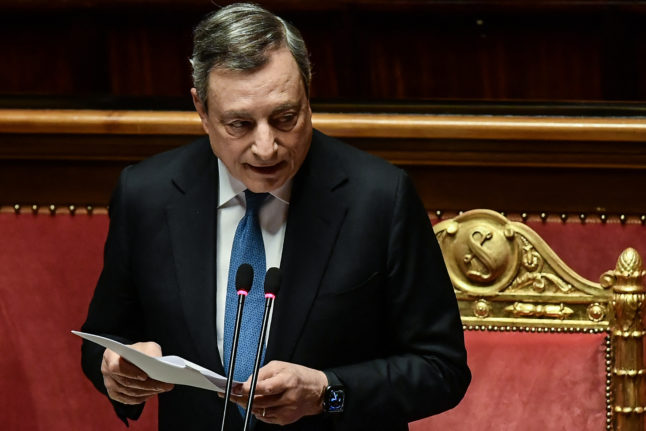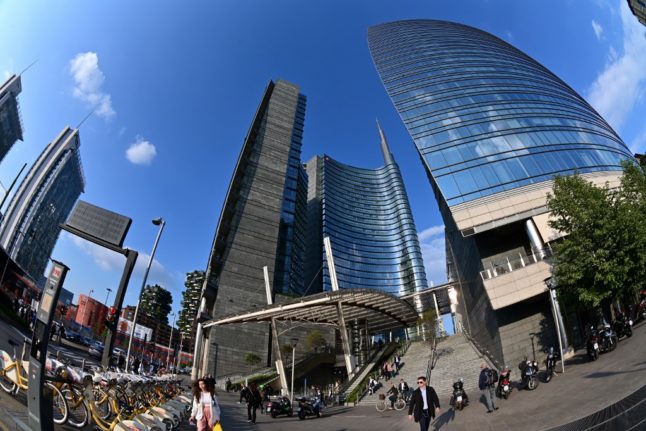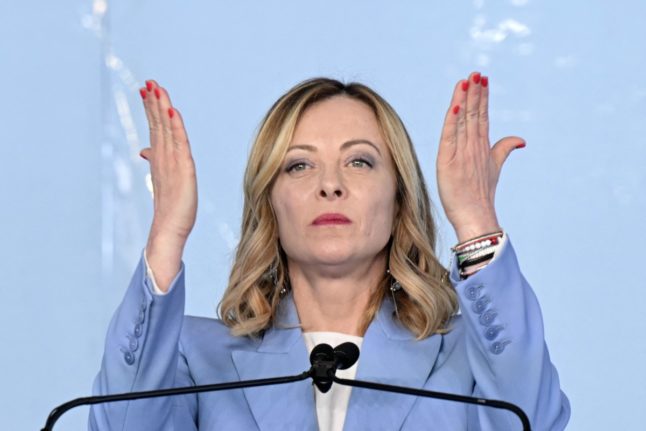As Italy was plunged into a political crisis on Thursday, shockwaves immediately rippled through the markets: Milan’s stock exchange was down more than three percent over fears Prime Minister Mario Draghi’s coalition government could come crashing down and spark snap elections.
All eyes are now on borrowing costs after the ‘spread’ – the closely watched gap between German and Italian 10-year interest rates – widened further on Friday following Draghi’s attempted resignation amid the deepening crisis.
READ ALSO: Four scenarios: What happens next in Italy’s government crisis?
But President Sergio Mattarella refused to accept the prime minister’s resignation – instead urging Draghi to address parliament on Wednesday in an attempt to find a way forward.
The country now faces prolonged uncertainty, with no clear path forward.
“Any signal that Draghi would not survive the 2023 parliamentary elections, or even leave office before, is a cause for concern for the markets,” Gilles Moec, chief economist at the Axa group, told AFP.
Although political crises are nothing new in Italy, Galietti said “this one is unprecedented” because of geopolitical factors, citing tensions with Russia over its invasion of Ukraine.
Even without the current political instability, Italy’s economic outlook is suffering due to “the size of its debt, its low growth rate and its strong dependence on Russian gas,” Moec said.

Italy has a mammoth debt of over 2.7 trillion euros or some 150 percent of GDP – the highest in the eurozone after Greece – though the debt-GDP ratio is beginning to shrink.
The country has long lagged behind others in the eurozone: between 1999 and 2019, the economy grew by just 7.9 percent compared to 30.2 percent in Germany, 32.4 percent in France and 43.6 percent in Spain.
Italy’s gross domestic product increased 6.6 by percent in 2021, after a 2020 slump due to the coronavirus pandemic.
The Bank of Italy expects GDP to increase by 3.2 percent in 2022 – but that figure could drop below one percent if Russian gas supplies are cut off over the war in Ukraine.
READ ALSO: Italian PM says Russia’s excuses for gas cut are ‘lies’ as shortfall continues
After former European Central Bank chief “Super Mario” became prime minister back in February 2021, Italy’s 10-year borrowing rate fell below 0.5 percent.
It has now climbed to 3.4 percent.
Italy is counting on the European recovery fund to boost growth. It’s the biggest beneficiary of all member states, set to receive 191.5 billion euros if it ticks off a series of EU-requested reforms aimed at, among other things, improving creaking infrastructure and preventing large-scale tax evasion.
Draghi’s departure, however, would put those reforms at risk.
More than a thousand Italian mayors signed a petition on Sunday pleading with Draghi to stay on, saying the post-pandemic recovery plan required stability.
“Our cities… cannot afford a crisis today that means immobilism and division,” the petition said.
“We need stability, certainty and consistency in order to continue the transformation of our cities… Because without the rebirth of these, Italy will not be reborn either.”
But with Draghi’s grand coalition in disarray, the chances the country will head to snap elections after the summer are high.
READ ALSO: ‘We need stability’: Hundreds of Italian mayors plead with Draghi to stay
A far-right or populist win at the polls would weigh significantly on the spread, just as it did in 2018, when Matteo Salvini’s anti-immigrant League joined forces with the once anti-establishment Five Star Movement.
Public finances are however unlikely to be derailed as in the 2012 crisis, economic experts said.
“Interest rates would have to rise very sharply and durably for us to begin to observe solvency problems,” Natixis economist Jesus Castillo told AFP.
Italy’s bonds last on average over seven years, which means the rise in rates will not immediately be reflected in debt.
What’s more, banks are in better shape now than in 2012.
“Economic fundamentals remain compatible with long-term debt sustainability,” Castillo said.



 Please whitelist us to continue reading.
Please whitelist us to continue reading.
Member comments